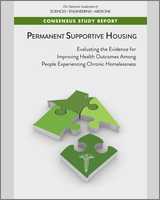NCBI Bookshelf. A service of the National Library of Medicine, National Institutes of Health.
National Academies of Sciences, Engineering, and Medicine; Health and Medicine Division; Board on Population Health and Public Health Practice; Policy and Global Affairs; Science and Technology for Sustainability Program; Committee on an Evaluation of Permanent Supportive Housing Programs for Homeless Individuals. Permanent Supportive Housing: Evaluating the Evidence for Improving Health Outcomes Among People Experiencing Chronic Homelessness. Washington (DC): National Academies Press (US); 2018 Jul 11.

Permanent Supportive Housing: Evaluating the Evidence for Improving Health Outcomes Among People Experiencing Chronic Homelessness.
Show detailsThe National Academies of SCIENCES • ENGINEERING • MEDICINE
TheNational Academy of Sciences was established in 1863 by an Act of Congress, signed by President Lincoln, as a private, nongovernmental institution to advise the nation on issues related to science and technology. Members are elected by their peers for outstanding contributions to research. Dr. Marcia McNutt is president.
TheNational Academy of Engineering was established in 1964 under the charter of the National Academy of Sciences to bring the practices of engineering to advising the nation. Members are elected by their peers for extraordinary contributions to engineering. Dr. C. D. Mote, Jr., is president.
TheNational Academy of Medicine (formerly the Institute of Medicine) was established in 1970 under the charter of the National Academy of Sciences to advise the nation on medical and health issues. Members are elected by their peers for distinguished contributions to medicine and health. Dr. Victor J. Dzau is president.
The three Academies work together as theNational Academies of Sciences, Engineering, and Medicine to provide independent, objective analysis and advice to the nation and conduct other activities to solve complex problems and inform public policy decisions. The National Academies also encourage education and research, recognize outstanding contributions to knowledge, and increase public understanding in matters of science, engineering, and medicine.
Learn more about the National Academies of Sciences, Engineering, and Medicine atwww.nationalacademies.org.
Consensus Study Reports published by the National Academies of Sciences, Engineering, and Medicine document the evidence-based consensus on the study's statement of task by an authoring committee of experts. Reports typically include findings, conclusions, and recommendations based on information gathered by the committee and the committee's deliberations. Each report has been subjected to a rigorous and independent peer-review process and it represents the position of the National Academies on the statement of task.
Proceedings published by the National Academies of Sciences, Engineering, and Medicine chronicle the presentations and discussions at a workshop, symposium, or other event convened by the National Academies. The statements and opinions contained in proceedings are those of the participants and are not endorsed by other participants, the planning committee, or the National Academies.
For information about other products and activities of the National Academies, please visitwww.nationalacademies.org/about/whatwedo.
- PubReader
- Print View
- Cite this PageNational Academies of Sciences, Engineering, and Medicine; Health and Medicine Division; Board on Population Health and Public Health Practice; Policy and Global Affairs; Science and Technology for Sustainability Program; Committee on an Evaluation of Permanent Supportive Housing Programs for Homeless Individuals. Permanent Supportive Housing: Evaluating the Evidence for Improving Health Outcomes Among People Experiencing Chronic Homelessness. Washington (DC): National Academies Press (US); 2018 Jul 11. The National Academies of SCIENCES • ENGINEERING • MEDICINE.
- PDF version of this title (2.5M)
- The National Academies of SCIENCES • ENGINEERING • MEDICINE - Permanent Supporti...The National Academies of SCIENCES • ENGINEERING • MEDICINE - Permanent Supportive Housing
Your browsing activity is empty.
Activity recording is turned off.
See more...